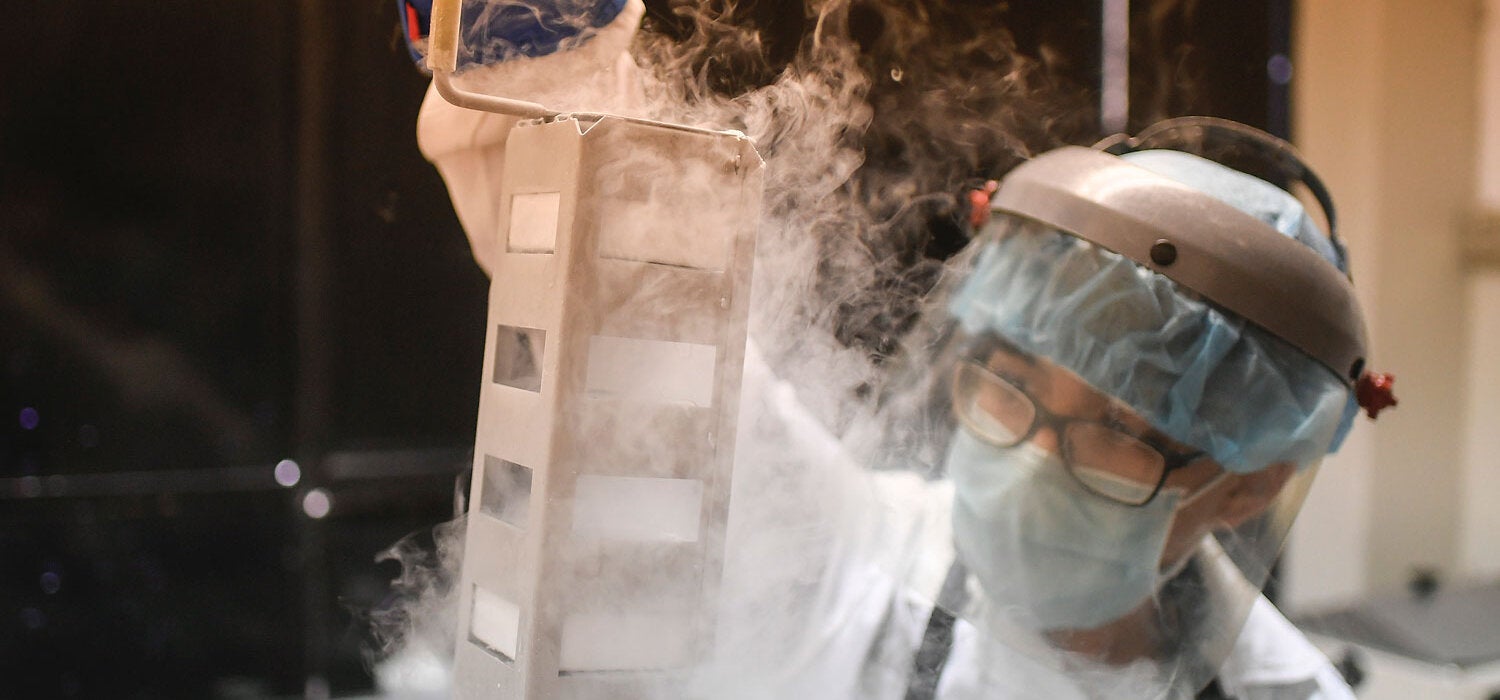Every last child, says the ribbon that circles the neck of Pierina D’Angelo. The inscription refers to the fight that promises to never give up until the last child in the world is free from poliomyelitis. And the passion that she puts into her work demonstrates that.
One feels the responsibility to give continuity to something that began in our country in 1960.
October 2021
D’Angelo, division coordinator of virology for the National Institute of Hygiene “Rafael Rangel”, stops in the hallways to respond to the doubts of patients and employees on the way to her office. With an inspiring vocation and the desire to “inject joy and dynamism into the team”, she works long hours in the laboratory.
Her career began 17 years ago after graduating with a bachelor’s degree in Bioanalysis. She finished her studies in the same City University that houses The National Institute of Hygiene (INHRR), an institution for the prevention, vigilance, and control of Venezuelan health, and national reference center for the Pan-American Health Organization/World Health Organization (PAHO/WHO). According to her, the institute has been of vital importance to the country, being also a center of training and sample processing from other states of the country.
D’Angelo’s commitment to her work is tangible, and the way she speaks denotes the great enthusiasm that she feels for carrying out her tasks successfully. “One feels the responsibility to give continuity to something that began in our country in 1960,” she says convincedly.
Through vaccination we can minimize the risk of transmission, of contagion.
The outbreaks that sounded the alarm
On the 30th anniversary of the absence of polio cases in Latin America, and highlighting the commitment of PAHO, the institute and its own, D’Angelo affirms that it is everyone’s duty to continue working together for the eradication of the disease.
With the exception of Afghanistan and Pakistan, the entire world is free of wild poliovirus and although cases derived from the oral polio vaccine (OPV) – in disuse – are infrequent, the severity of this disease remains a source of concern for specialists, who with dedication feel the responsibility to continue the path towards eradication.
For this reason, with the support of PAHO, Venezuela’s Expanded Program on Immunizations aimed at reducing at minimizing the risks of polio outbreaks by incorporating the inactivated polio vaccine (IPV) and substituting the trivalent oral polio vaccine (tOPV) for the bivalent oral polio vaccine (bOPV). The National Institute of Hygiene, for its part, ensured that all stool samples stored in potentially infectious poliovirus laboratories were destroyed.
It’s a struggle that began very sadly, but I’m sure that it will end happily with global eradication.
Nothing is random
The coronavirus pandemic has represented a great challenge for health professionals, including Lieska Rodriguez, Director General of Diagnostics at the National Institute of Hygiene, and D’Angelo, who work hand in hand in a multitudinous and multidisciplinary team, as they describe it. For them, the pandemic has meant many hours of extra work, but what seems to be of greater importance to Rodriguez has been not to “neglect or undermine” any of the other diagnoses, above all that of poliomyelitis. For her, it is a fact that the Venezuelan population prioritizes vaccination, ensures that the inhabitants always seek to immunize themselves against the risks, and fully trusts in the national vaccination record, which offers vaccines starting from birth.
And the main challenge imposed by the pandemic for Pierina D’Angelo, demonstrates once again her commitment. For her it has been “to transmit confidence to the country” that the team she works with day by day guarantees that any microbiological agent that might affect them is detected. According to Pierina, the fact that the 30th anniversary of the elimination of wild polio in the Americas coincides with a pandemic is not a matter of chance, but a sign of the success of vaccination protocols. “Through vaccination we can minimize the risk of transmission, of contagion,” she says, while inviting people to get themselves immunized, since according to her, the message is clear and unequivocal: “You have to get vaccinated against the coronavirus with the vaccine that is available.” That we can “celebrate” in her words, the 30 years without cases of wild poliovirus in the region, also represents the duty to maintain and promote vaccination.
Seeing the small but impressive museum inside the Institute of Hygiene. D’Angelo feels a firm responsibility to continue in the fight for the eradication of poliomyelitis and does not hide her emotion: “It’s a struggle that began very sadly, but I’m sure that it will end happily with global eradication.”




